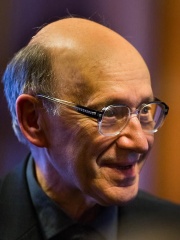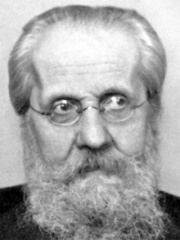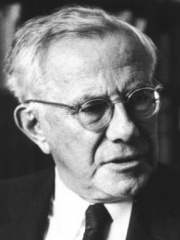
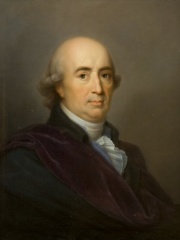
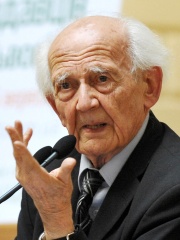
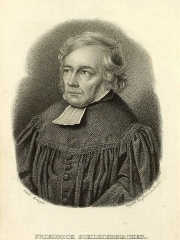
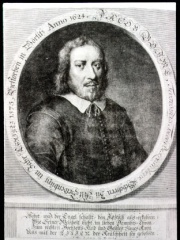
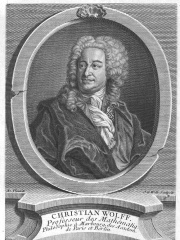
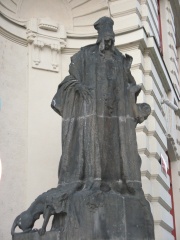
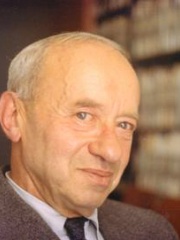
The Most Famous
PHILOSOPHERS from Poland
This page contains a list of the greatest Polish Philosophers. The pantheon dataset contains 1,267 Philosophers, 31 of which were born in Poland. This makes Poland the birth place of the 11th most number of Philosophers behind China, and Spain.
Top 10
The following people are considered by Pantheon to be the top 10 most legendary Polish Philosophers of all time. This list of famous Polish Philosophers is sorted by HPI (Historical Popularity Index), a metric that aggregates information on a biography's online popularity. Visit the rankings page to view the entire list of Polish Philosophers.

1. Arthur Schopenhauer (1788 - 1860)
With an HPI of 87.55, Arthur Schopenhauer is the most famous Polish Philosopher. His biography has been translated into 106 different languages on wikipedia.
Arthur Schopenhauer ( SHOH-pən-how-ər; German: [ˈaʁtuːɐ̯ ˈʃoːpn̩haʊɐ] ; 22 February 1788 – 21 September 1860) was a German philosopher. He is known for his 1818 work The World as Will and Representation (expanded in 1844), which characterizes the phenomenal world as the manifestation of a blind and irrational noumenal will. Building on the transcendental idealism of Immanuel Kant, Schopenhauer developed an atheistic metaphysical and ethical system that rejected the contemporaneous ideas of German idealism. Schopenhauer was among the first philosophers in the Western tradition to share and affirm significant tenets of Indian philosophy, such as asceticism, denial of the self, and the notion of the world-as-appearance. His work has been described as an exemplary manifestation of philosophical pessimism. Though his work failed to garner substantial attention during his lifetime, he had a posthumous impact across various disciplines, including philosophy, literature, and science. His writing on aesthetics, morality and psychology has influenced many thinkers and artists.

2. Johann Gottfried Herder (1744 - 1803)
With an HPI of 79.32, Johann Gottfried Herder is the 2nd most famous Polish Philosopher. His biography has been translated into 67 different languages.
Johann Gottfried von Herder ( HUR-dər; German: [ˈjoːhan ˈɡɔtfʁiːt ˈhɛʁdɐ]; 25 August 1744 – 18 December 1803) was a Prussian philosopher, theologian, pastor, poet, and literary critic. Herder is associated with the Age of Enlightenment, Sturm und Drang, and Weimar Classicism. He was a Romantic philosopher and poet who argued that true German culture was to be discovered among the common people (das Volk). He also stated that it was through folk songs, folk poetry, and folk dances that the true spirit of the nation (der Volksgeist) was popularized. He is credited with establishing or advancing a number of important disciplines: hermeneutics, linguistics, anthropology, and "a secular philosophy of history."

3. Zygmunt Bauman (1925 - 2017)
With an HPI of 76.74, Zygmunt Bauman is the 3rd most famous Polish Philosopher. His biography has been translated into 54 different languages.
Zygmunt Bauman (; Polish: [ˈbauman]; 19 November 1925 – 9 January 2017) was a Polish–British sociologist and philosopher. He was driven out of the Polish People's Republic during the 1968 Polish political crisis and forced to give up his Polish citizenship. He emigrated to Israel; three years later, he moved to the United Kingdom. He resided in England from 1971, where he studied at the London School of Economics and became Professor of Sociology at the University of Leeds, later emeritus. Bauman was a social theorist, writing on issues as diverse as modernity and the Holocaust, consumerism in postmodernity, and liquid modernity.

4. Friedrich Schleiermacher (1768 - 1834)
With an HPI of 75.81, Friedrich Schleiermacher is the 4th most famous Polish Philosopher. His biography has been translated into 52 different languages.
Friedrich Daniel Ernst Schleiermacher (; German: [ˈfʁiːdʁɪç ˈʃlaɪɐˌmaxɐ]; 21 November 1768 – 12 February 1834) was a German Reformed theologian, philosopher, and biblical scholar known for his attempt to reconcile the criticisms of the Enlightenment with traditional Protestant Christianity. He also became influential in the evolution of higher criticism, and his work forms part of the foundation of the modern field of hermeneutics. Because of his profound effect on subsequent Christian thought, he is often called the "Father of Modern Liberal Theology" and is considered an early leader in liberal Christianity. The neo-orthodoxy movement of the twentieth century, typically (though not without challenge) seen to be spearheaded by Karl Barth, was in many ways an attempt to challenge his influence. As a philosopher he was a leader of German Romanticism.
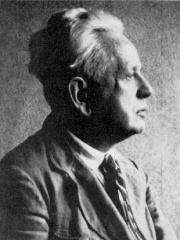
5. Ernst Cassirer (1874 - 1945)
With an HPI of 75.36, Ernst Cassirer is the 5th most famous Polish Philosopher. His biography has been translated into 51 different languages.
Ernst Alfred Cassirer ( kah-SEER-ər, kə-; German: [ˈɛʁnst kaˈsiːʁɐ]; July 28, 1874 – April 13, 1945) was a German philosopher and historian of philosophy. Trained within the Neo-Kantian Marburg School, he initially followed his mentor Hermann Cohen in attempting to supply an idealistic philosophy of science. After Cohen's death in 1918, Cassirer developed a theory of symbolism and used it to expand the "logic and psychology of thought" into a more general "logic of the cultural sciences". Cassirer was one of the leading 20th-century advocates of philosophical idealism. His most famous work is the Philosophy of Symbolic Forms (1923–1929). Though his work received a mixed reception shortly after his death, more recent scholarship has remarked upon Cassirer's role as a strident defender of the moral idealism of the Enlightenment era and the cause of liberal democracy at a time when the rise of fascism had made such advocacy unfashionable. Within the international Jewish community, Cassirer's work has additionally been seen as part of a long tradition of thought on ethical philosophy.

6. Jakob Böhme (1575 - 1624)
With an HPI of 75.24, Jakob Böhme is the 6th most famous Polish Philosopher. His biography has been translated into 48 different languages.
Jakob Böhme (; German: [ˈbøːmə]; 24 April 1575 – 17 November 1624) was a German philosopher, Christian mystic, and Lutheran Protestant theologian. He was considered an original thinker by many of his contemporaries within the Lutheran tradition, and his first book, commonly known as Aurora, caused a great scandal. In contemporary English, his name may be spelled Jacob Boehme (retaining the older German spelling); in seventeenth-century England it was also spelled Behmen, approximating the contemporary English pronunciation of the German Böhme. Böhme had a profound influence on later philosophical movements such as German idealism and German Romanticism. Hegel described Böhme as "the first German philosopher".

7. Christian Wolff (1679 - 1754)
With an HPI of 74.23, Christian Wolff is the 7th most famous Polish Philosopher. His biography has been translated into 51 different languages.
Christian Wolff (; less correctly Wolf, German: [vɔlf]; also known as Wolfius; ennobled as Christian Freiherr von Wolff in 1745; 24 January 1679 – 9 April 1754) was a German philosopher. Wolff is characterized as one of the most eminent German philosophers between Leibniz and Kant. His life work spanned almost every scholarly subject of his time, displayed and unfolded according to his demonstrative-deductive, mathematical method, which some deem the peak of Enlightenment rationality in Germany. Wolff wrote in German as his primary language of scholarly instruction and research, although he did translate his works into Latin for his transnational European audience. A founding father of, among other fields, economics and public administration as academic disciplines, he concentrated especially in these fields, giving advice on practical matters to people in government, and stressing the professional nature of university education.

8. Judah Loew ben Bezalel (1512 - 1609)
With an HPI of 71.87, Judah Loew ben Bezalel is the 8th most famous Polish Philosopher. His biography has been translated into 38 different languages.
Judah Loew ben Bezalel (Hebrew: יהודה ליווא בן בצלאל; c. 1524 – 17 September 1609), also known as Rabbi Loew (alt. Löw, Loewe, Löwe or Levai), the Maharal of Prague (Hebrew: מהר״ל מפראג), or simply the Maharal (the Hebrew acronym of "Moreinu ha-Rav Loew", "Our Teacher, Rabbi Loew"), was an important Talmudic scholar, Jewish mystic, mathematician, astronomer, and philosopher who, for most of his life, served as a leading rabbi in the cities of Mikulov in Moravia and Prague in Bohemia. Loew wrote on Jewish philosophy and Jewish mysticism. His work Gur Aryeh al HaTorah is a supercommentary on Rashi's Torah commentary. He is also the subject of a later legend that he created the Golem of Prague, an animate being fashioned from clay.

9. Alfred Tarski (1901 - 1983)
With an HPI of 70.88, Alfred Tarski is the 9th most famous Polish Philosopher. His biography has been translated into 49 different languages.
Alfred Tarski (; Polish: [ˈtarskʲi]; born Alfred Teitelbaum; January 14, 1901 – October 26, 1983) was a Polish-American logician and mathematician. A prolific author best known for his work on model theory, metamathematics, and algebraic logic, he also contributed to abstract algebra, topology, geometry, measure theory, mathematical logic, set theory, type theory, and analytic philosophy. Educated in Poland at the University of Warsaw, and a member of the Lwów–Warsaw school of logic and the Warsaw school of mathematics, in 1939 he immigrated to the United States, where in 1945 he became a naturalized citizen. Tarski taught and carried out research in mathematics at the University of California, Berkeley, from 1942 until his death in 1983. His biographers Anita Burdman Feferman and Solomon Feferman state that, "Along with his contemporary, Kurt Gödel, he changed the face of logic in the twentieth century, especially through his work on the concept of truth and the theory of models."
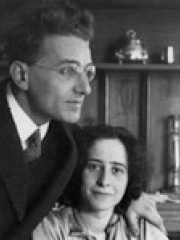
10. Günther Anders (1902 - 1992)
With an HPI of 69.32, Günther Anders is the 10th most famous Polish Philosopher. His biography has been translated into 25 different languages.
Günther Anders (German: [ˈɡʏntɐ ˈandɐs]; born Günther Siegmund Stern, 12 July 1902 – 17 December 1992) was a German-born philosopher, journalist and critical theorist. Trained as a philosopher in the phenomenological tradition, he obtained his doctorate under Edmund Husserl in 1923 and worked then as a journalist at the Berliner Börsen-Courier. At that time, he changed his name Stern to Anders. He unsuccessfully tried to get a university tenure in the early 1930s and ultimately fled Nazism to the United States. Back to Europe in the 1950s, he published his major book, The Obsolescence of Man, in 1956. The title of this work has also been translated as The Obsolescence of Humanity. An important part of Gunther Anders' work focuses on the self-destruction of mankind, through a meditation on the Holocaust and the nuclear threat. Anders developed a philosophical anthropology for the age of technology, dealing with such other themes as the effects of mass media on our emotional and ethical existence, the illogic of religion, and the question of being a thinker. He was awarded the Sigmund Freud Prize shortly before his death, in 1992.
People
Pantheon has 31 people classified as Polish philosophers born between 1390 and 1936. Of these 31, 1 (3.23%) of them are still alive today. The most famous living Polish philosophers include Michał Heller. The most famous deceased Polish philosophers include Arthur Schopenhauer, Johann Gottfried Herder, and Zygmunt Bauman.
Living Polish Philosophers
Go to all RankingsDeceased Polish Philosophers
Go to all RankingsArthur Schopenhauer
1788 - 1860
HPI: 87.55
Johann Gottfried Herder
1744 - 1803
HPI: 79.32
Zygmunt Bauman
1925 - 2017
HPI: 76.74
Friedrich Schleiermacher
1768 - 1834
HPI: 75.81
Ernst Cassirer
1874 - 1945
HPI: 75.36
Jakob Böhme
1575 - 1624
HPI: 75.24
Christian Wolff
1679 - 1754
HPI: 74.23
Judah Loew ben Bezalel
1512 - 1609
HPI: 71.87
Alfred Tarski
1901 - 1983
HPI: 70.88
Günther Anders
1902 - 1992
HPI: 69.32
Heinrich Rickert
1863 - 1936
HPI: 68.77
Paul Tillich
1886 - 1965
HPI: 68.08
Overlapping Lives
Which Philosophers were alive at the same time? This visualization shows the lifespans of the 23 most globally memorable Philosophers since 1700.

